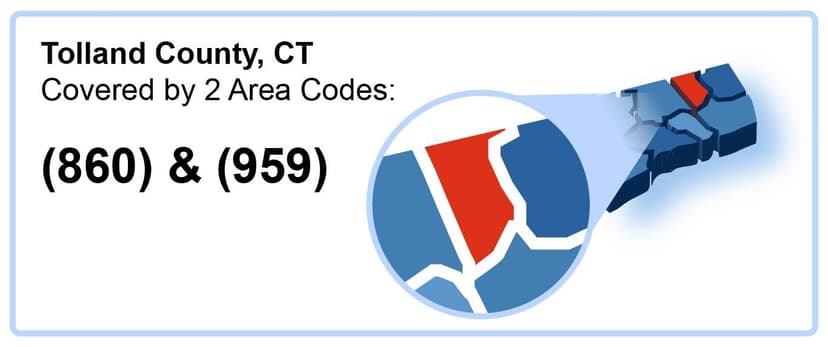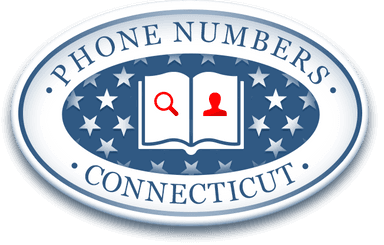What are Tolland County Area Codes?

An area code is a set of three-digit numbers that begins a phone number in North America. It was instituted by the North American Numbering Plan (NANP) to ease the placing of long-distance calls. Area codes designate the telephone areas in a state as Numbering Plan Areas (NPAs) and identify the origin and destination of phone calls. The Public Utilities Regulatory Authority of the State of Connecticut implements and manages Tolland County area codes.
Tolland County currently has two active area codes. These are:
Area Code 860
Area code 860 was created in 1995 from a split of the 203 NPA. It covers Hartford, Manchester, Tolland, and Thompson in Tolland County.
Area Code 959
Area code 959 is an overlay code to the 860 NPA, which officially came into service in 2014. It covers all the locations served by area code 860.
What are the Best Cell Phone Plans in Tolland County?
According to a survey carried out in 2018 by the National Center of Health Statistics (NCHS), about 40.8% of adult Connecticut residents exclusively used wireless telephones. In contrast, only about 6.6% of them used landlines. Similarly, an estimated 50.6% of the children's population (under 18 years) used wireless-only services, while 2.3% of them still used landline phones as their sole telephony devices. These numbers indicate a growing preference for wireless telephony services in Tolland County.
The four major phone carriers in the United States provide network services in Tolland County. T-Mobile offers about 92% coverage, followed by Verizon at 86%. AT&T has a network reach estimated at 74%, while Sprint covers about 70% of the county. According to the FCC, factors such as proximity to a cell site may influence the performance of these phone carriers.
Voice over Internet Protocol (VoIP) is gaining widespread patronage in Tolland County as an alternative telephony option. It provides telephony services over broadband internet connections. To use VoIP, users need traditional phones connected to a special adapter, computers, smartphones, tablets, or specialized VoIP phones. VoIP supports long-distance calling at relatively cheaper rates than traditional telephone services.
What are Tolland County Phone Scams?
Phone scams in Tolland County are deceptive activities perpetrated against county residents via phone calls or text messages. They primarily seek to obtain money or confidential information from their targets. Such information may include financial or personal details. Scammers typically impersonate trusted entities and spoof their targets’ Caller IDs to appear legitimate when attempting to fleece unsuspecting residents. Reverse phone lookup services can help individuals to identify potential scams and prevent them from falling victims. The prevalent phone scams in Tolland County include:
What are Telemarketing Scams?
Scammers pretend to be agents of legitimate telemarketing organizations and call Tolland County residents to defraud them. Some of these fraudulent telemarketers inform their targets of fake promo sales. They entice the targets with overly attractive discounts in seemingly quick and limited deals. Some scammers offer investment opportunities that promise high returns with insignificant or no risks at all. In other quarters, fraudulent telemarketers may inform their targets that they were selected as winners and advise them to pay specific fees to redeem their prize. In most cases, residents who part with money with the hopes of getting something in return usually get nothing.
These scammers use phone spoofing to manipulate their targets’ Caller IDs to disguise themselves as legitimate telemarketing companies and fool them into answering their calls. They most times demand immediate payment through odd payment methods such as gift cards and bitcoins. Phone number search applications can help residents retrieve information on these callers in case of any suspicion.
What are IRS Impersonation Scams?
These scams involve scammers who claim to be representatives of the Internal Revenue Service (IRS). They aim to manipulate residents into making tax payments to them. They also coerce individuals to disclose financial information that is otherwise confidential. Targets who resist the scammers’ requests are often threatened with legal actions such as deportation, license revocation, lawsuit, or arrest. These scammers use phone spoofing technology to disguise their phone numbers as those of the IRS and appear credible. Residents who are contacted by unknown persons with bogus tax claims can conduct free reverse phone lookups to answer the question, "who is this number registered to?"
The IRS provides Tolland County residents with helpful information on how to spot IRS phone scams. Requests for confidential information such as debit card details over the phone is most likely not from the IRS. The IRS does not threaten residents with punitive actions to get them to comply with their demands. The IRS warns residents to beware of callers who insist on receiving payments via specific channels. Residents who receive such phone calls may verify them by contacting the IRS. Reverse cell phone lookup services can uncover the identities of IRS impersonators.
What are Grant Scams?
Grant Scams in Tolland County involve fraudsters who call residents and offer them access to grants allegedly by reputable foundations at a fee. Tolland County residents who fall prey to these scams never get to receive any grant. The Department of Consumer Protection(DCP) of the State of Connecticut warns that most foundations do not give money away. They only avail grants to nonprofits whose plans and activities are in line with the interests of their foundation. Residents who receive these such calls and suspect frauds may contact the named foundation on their official phone numbers to verify the callers’ claims. Reverse phone lookup services can return identifying information on such callers.
What are Robocalls and Spam Calls?
Robocalls are automated phone calls configured to deliver recorded messages to the selected phone numbers. It is commonly used by political campaign organizations, telemarketing companies, and nonprofit organizations to reach mass audiences at once. Robocalls enable users to receive responses from the recipients via predefined prompt response codes. Such feedback ability makes robocalls a prime tool for phone scammers. Scammers often manipulate their targets to disclose confidential information by responding to robocall prompts.
Spam calls are unwanted calls placed without recipients’ prior permission. Scammers use spam calls to pitch sales for malicious purposes. Robocalls are a form of spam calls. Installing call blocking apps can help residents detect and block spam calls. Residents can also use phone number lookup services to verify suspicious phone numbers. Some precautionary actions may help Tolland County residents to avoid robocall scams. These include:
- Avoid answering calls from unknown phone numbers.
- Hang up your phone once you suspect an illegal robocall. The FTC warns that robocalls may offer to transfer your call to live representatives and advises that you ignore such prompts to avoid more robocalls.
- File complaints of robocalls abuse with the FTC online. Make sure to provide the caller’s phone number while reporting to assist the FTC in their investigations.
- Register your phone number on the National Do Not Call Registry managed by the FTC. Although the registry limits the frequency of robocalls received by registered phone users, it still permits robocalls from a few exempt legitimate sources. Residents can leverage free reverse phone lookup services to verify the authenticity of robocalls.
How Can You Spot and Report Tolland County Phone Scams?
Scammers in Tolland County are maximizing the latest communication technologies in their scam schemes. As such, it is recommended that residents stay current with vital information provided periodically by the government and law enforcement agencies. Residents who suspect or fall victim to a phone scam may file a complaint with the appropriate agency for proper investigations. The following are common signs that a phone call may be from scammers:
- The caller uses threats of deportation, lawsuit, license revocation, and arrest to obtain compliance.
- The caller requests confidential information such as debit card details, PINs, and password. It is important to note that legitimate organizations do not make such requests over the phone.
- Business and investment offer that promises high return rates with little or no risks are potential scams. The callers often demand immediate payment without allowing you to make adequate assessment.
- It is characteristic of phone scammers to alter their targets’ Caller IDs. If you suspect such, then it is a scam call. You can leverage free phone number lookup services to retrieve identifying information on a suspicious phone number.
- The caller requests immediate payment via unofficial methods such as gift cards and bitcoins, and wire transfers.
Several government agencies provide information that helps Tolland County residents mitigate phone scams. They include:
Connecticut Division of State Police - The Division of State of Police, under the Connecticut State Department of Emergency Services and Public Protection, provides security information and assistance to residents of Tolland County. Residents can use the online crime reports service provided by the division to file phone scam complaints.
Federal Trade Commission (FTC) - The FTC educates residents on how to avoid illegal robocalls. The DNC Registry managed by the FTC helps registered residents reduce robocalls inundation. Residents who fall prey to phone scams can file reports with the FTC online.
Better Business Bureau (BBB) - The BBB provides residents with an online scam tracker for reporting cases of financial fraud perpetrated over the phone. The tracker also helps residents in verifying information about registered businesses and organizations.
